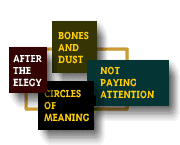
citation
Citation ought to aid and inform the reader and acknowledge intellectual debt.
The list of Cited Material in The Gutenberg Elegies seems to be an exercise in name dropping. Birkerts scrupulously cites novelists and critics with cachet, even when he mentions their work only in passing. Virginia Woolf, Graham Swift, V.S. Naipul, Lionel Trilling, Walker Percy, Walter Benjamin: none of their work is discussed in detail, but their names look great on the page.
The cited materials, curiously, exclude the two hypertexts Birkerts actually mentions in this monograph on hypertext: Stuart Moulthrop's Victory Garden and Perseus, edited by Greg Crane et al. Also forgotten are Robert Coover's reviews from the New York Times -- the real subject matter of Birkerts' chapter on hypertext.
If Birkerts has an argument to make, it concerns the distinction between the experience of transitory text on the screen and static text on the page. The same issue is central to Jay David Bolter's Writing Space. Is Birkerts rediscovering the same argument or is he trying to put forth an original thesis? A chapter of Lanham's The Electronic Word discusses in depth the interplay between immersive reading and appreciation of the book as artifact, situating this tension within a broad historical and epistemological context in the study of rhetoric: does Birkerts ignore Lanham to distance himself from Lanham's argument or simply because Birkerts overlooked the earlier work? The first edition of Landow's Hypertext: The Convergence of Contemporary Critical Theory and Technology situates hypermedia within a tradition of critical reading and interpretation; sections of Birkerts' monograph that recount the emotional, deeply personal, and redemptive power of reading might be taken to respond to Landow, but we cannot be certain that Birkerts knew Landow's work.
Bolter, Landow, and Lanham reaches different conclusions; because the citations clearly are incomplete, we cannot know whether Birkerts is responding to them or is simply unaware of previous work.